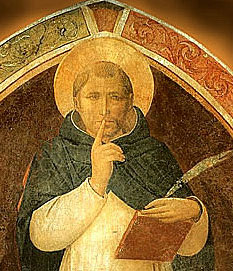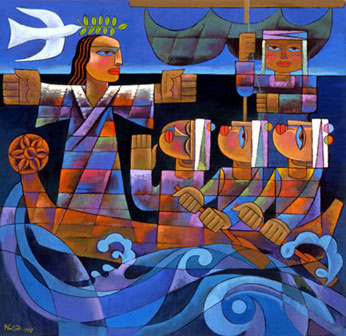
Think! by Deborah Beach Giordano
Eh? What did He say?
 Whenever this passage is read, we nod in knowing agreement at the (deservedly famous) “love God and love your neighbor” quotation, and then go deaf. Well, as near as, anyhow: certain that we’ve heard the important teaching, we stop listening.
Whenever this passage is read, we nod in knowing agreement at the (deservedly famous) “love God and love your neighbor” quotation, and then go deaf. Well, as near as, anyhow: certain that we’ve heard the important teaching, we stop listening.
But wait! There’s more!
But there’s more. Jesus continues by challenging His interrogators with a question of His own. “This messiah you’re looking for,” Jesus asks, “whose son is he?”
Reflexively they reply, as if in a single voice: “The son of David.” What a question to ask! Everybody knew the answer. It was so obvious it hardly needed saying. That the messiah would be the son of David was accepted absolutely and unconditionally; conventional wisdom, we might call it.
Hmmm, says Jesus, if that’s so,
How is it then that David by the Spirit calls him ‘Lord,’ saying, ‘The Lord said to my lord: Sit at my right hand, until I put your enemies under your feet’? If David thus calls him Lord, how can he be his son?”
Huh?
 Huh? It’s an odd, complicated saying from Jesus. The words are simple enough, the sentence structure quite correct; it’s only the meaning that is hard to grasp. There are so many “lords” mentioned in there, it’s hard to know who’s who.
Huh? It’s an odd, complicated saying from Jesus. The words are simple enough, the sentence structure quite correct; it’s only the meaning that is hard to grasp. There are so many “lords” mentioned in there, it’s hard to know who’s who.
It’s a conundrum, a challenging question that leaves us scratching our heads, causing us to actively consider what was just said. We can’t produce an immediate, reflexive response. It’s complicated!
And so we pause in silence, and think. Just like the Pharisees did that day.
How can this be answered? Hmmm…. It does seem unlikely that David would use the term “lord” in speaking of his own son. There’s no record of that anywhere. But there are plenty of his psalms which praise the Lord God. Is it possible? Oh surely not! Could the messiah be someone — someTHING other than what we’ve been expecting. Could it be that “what everybody knows” is wrong? Can it be that maybe we don’t know what we think we know?
A Thoughtful Silence
We are told that after this the Pharisees did not “dare” to ask Jesus any more questions. But there had been no conflict, no condemnations, no argument during their encounter; they had no cause for fear. Perhaps the reason for their loss of nerve was that they were so distressed and disoriented at being unable to answer the Lord’s question.
 This was not something they were used to, and they wouldn’t have wanted to repeat the experience. The Pharisees thought of themselves as intelligent, knowledgeable, wise. They were accustomed to having all the answers; to declaring what was theologically correct: to being both righteous and right. Then along comes this Jesus — this rural “teacher,” this country bumpkin parson — tossing out a challenge that stumps them, makes them appear foolish…. even, possibly, wrong!
This was not something they were used to, and they wouldn’t have wanted to repeat the experience. The Pharisees thought of themselves as intelligent, knowledgeable, wise. They were accustomed to having all the answers; to declaring what was theologically correct: to being both righteous and right. Then along comes this Jesus — this rural “teacher,” this country bumpkin parson — tossing out a challenge that stumps them, makes them appear foolish…. even, possibly, wrong!
The easy answer they had always relied on no longer made sense. Jesus’ question brought the issue into a new light, giving a different perspective on the idea of the “messiah.” What had seemed so clear and simple now appeared complicated and uncertain.
And so the Pharisees retreated in frustration and confusion — and probably anger. A “sure thing,” had ceased to be so sure; their confidence had been shaken, and their reputation damaged. They didn’t have all the answers, after all. Now they had to go home and rethink what they thought they knew.
And nobody really wants to do that.
There’s No Time!?
Thinking — really thinking — is hard; that’s why we do so little of it. It’s easier to fall back on what we think we know. It takes time and energy to investigate, evaluate, and assess options and ideas. And, more than ever, instant communication and continuous news cycles pressure us to react rather than reflect: to respond immediately to the storm of words and images.

It feels as if there is no time to consider, no chance to form clearly thought-out opinions. Pushed and rushed, we grow tired; exhausted by the struggle, overwhelmed by all that we hear and see. Like drowning sailors, we grasp at simple solutions, and cling to easy answers — whatever is nearest — just to keep our heads above water.
But then we meet up with that Jesus. He arrives when we are most at sea — even when we think we’re secure, convinced that we’re right and righteous. Confident in our certainty, sure that our world-view is correct, we don’t notice that we’re slowly sinking.
Jesus Saves
Jesus saves us when we’ve gone astray. In answer to the shouts of the crowd, Jesus challenges “common knowledge,” and confronts our assumptions and prejudices. We are human beings, constrained by time and tides; neither all-knowing nor all-wise. We can be mistaken, misled, confused, and outright wrong. It happens. It can happen particularly forcefully when we think we have all the answers.
“What do you think of the Messiah? Whose son is he?"
The moment Jesus asked it, the crowd of Pharisees thought they knew the answer to this question. The messiah will be a son of David: known by his pedigree and his fighting prowess; of royal blood, powerful and self-assured, he will save his people from their troubles and found a New Kingdom where Everything will be Just Peachy, all day every day.
But that pesky Jesus challenges them with a passage from the Scriptures that gives the game away. In the psalm, David sings to his Redeemer and Savior, his Lord — and it isn’t addressed to his son. David is not the father of the messiah. In fact, there’s only one Parent who it can be.
It is God who encouraged David in his time of doubt and distress, it is God who strengthened him, it is God who led him to victory. God is the Father of the messiah, God is the Fount of our courage, God is the Source of our salvation. It is God who is the Lord over all.
Thus does Jesus save us from a potentially disastrous mistake: looking for a savior in human form — while at the same time revealing the absurd (but frighteningly earnest) fantasies we carry of what this imagined messiah/son of David should do for us.
A New Heaven and a New Earth?
In our search for a messiah — a savior who will solve all of our problems, Jesus directs us to God. Any human leader will be …. well, human: flawed and fallible. Even the celebrated King David was not always an exemplar of morality or prudent leadership.

When we seek salvation from any human being — politician, priest, prophet, pundit, or “personality” — our desire is doomed to failure. All fall short of the glory of God… and of our fantasies. Yet the powers of this world play upon our yearnings with promises of a new heaven and new earth if only…. If only we buy their product, use their service, donate to their cause, vote for their candidate. Lies, all — but ever so enticing!
It is only when we look to the Lord Christ — the One we proclaim the Messiah, the son of God — that we shall find the salvation we seek. The new heaven must arise within us: in our thinking, our hope, our plans, our prayers, our efforts. Its foundations will be built from Christ’s teaching that we all know so well:
“You shall love the Lord your God with all your heart, and with all your soul, and with all your mind. This is the greatest and first commandment. And a second is like it: You shall love your neighbor as yourself.”
To seek an earthly messiah is foolhardy and futile. Our only hope is in the Way of the Lord Christ: working together in the Spirit of peace and compassion, courage and faith.
May Christ’s peace, wisdom, and love abound,
Deborah ✟
Suggested Spiritual Exercises
“What do you think of the Messiah? Whose son is he?"
If you believe that Jesus is the Messiah, are you willing to put your heart, your soul, and your mind to work for His Gospel?